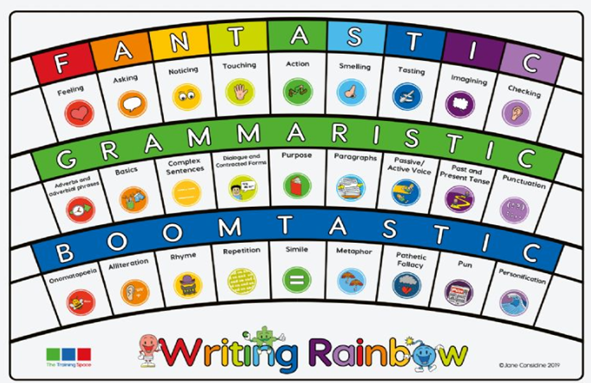

English
1) READING
Intent
At Trinity we believe that young people have the right to a rich, inspiring and memorable education that takes them beyond the everyday. Reading is the key to unlocking a child’s future; it provides children with the power to access a world beyond their existing experiences. At Trinity all children will be immersed in a variety of texts that takes them on an exciting and diverse journey, opening their eyes to a range of cultural and social contexts that will broaden their horizons and ignite their imagination. Our children will develop a life-long love of reading and become passionate and confident readers who are able to use and apply their skills, not only across the curriculum but throughout their lives.
Implementation
Reading lessons
- Reading lessons are taught to children in KS2 three times a week for 30 minutes.
- Lessons are whole class reading sessions where an extract is explored at depth through the lenses of vocabulary, retrieval, inference, prediction and summary.
- One lesson has a fluency focus, where children read the extra through the medium of paired, echo or choral reading.
- Where needed, some groups of children are exposed to the extracts in advance of these sessions in a ‘pre read’ with a teaching assistant.
Class novel and book club
- Every class across the school has a class novel session at least four times a week (daily in EYFS). This is an opportunity for children to have a story read to them, to become immersed in a book, and to share this experience collectively as a class. It is also a vital chance for the children to be read to, with the teacher modelling correct fluency through the use of intonation, expression and prosody.
- Our class novels are taken from our Reading spine (see separate document).
- In Years 1-6 book club happens once a week as an opportunity for both staff and children to recommend books to one another and to discuss what they have read.
Reading for pleasure
- All children at Trinity are able to take part in our ‘Trinity Reading Challenge’ which has been set up to encourage children to read more widely and to gain reading miles.
- Reading Champions from Year 6 support the promotion of reading across the school
- In Years 1-6 children are assessed using the PM Benchmark system. The results place the children on a level from between 1 and 30, based on their fluency as well as their ability to decode, comprehend and retell a text. Children who reach beyond level 30 are classed as free readers.
- Children working between levels 1 to 30 are provided with an instructional reading book within a band that is matched to their ability. They are also expected to have a reading for pleasure book to ensure a love of reading is still fostered.
- In Years 1-6 children are assessed three times a year using PUMA tests. Standardised scores and reading ages are calculated using these assessments.
- In KS2 children’s fluency and reading speed is assessed twice a year.
- All of the above assessments are used to inform teacher judgements which are input into INSIGHT three times a year. From this, our priority readers are identified.
- Each year group has priority readers identified. These are children who are not currently working at age related expectations.
- Priority readers read daily with an adult.
- For a list of suggested books, please CLICK HERE or on the link to the right of this page
Impact
As a result of our Reading curriculum:
- Children will be fluent readers by the end of Key Stage 1, due to the teaching of systematic phonics.
- Children of all abilities will be able to succeed in all reading lessons
- Children will enjoy reading across a range of genres
- Children will have a good knowledge of a range of authors
Attainment in reading is measured using statutory assessments at the end of EYFS, KS1 and KS2. Additionally, we track our own reading attainment through the use of Little Wandle, PIRA and PM Benchmark assessments. Most importantly, we believe that reading is the key to unlocking a new world for our children and so the impact of reading reaches far beyond the results of assessments. Children have the opportunity to enter the wide and varied magical worlds that reading opens up to them. As they develop their own interest in books, a deep love of literature across a range of genres, cultures and styles is nurtured and encouraged.
2) WRITING
Intent
It is our belief that our pupils should:
- learn how to speak confidently, express themselves and communicate effectively in groups of different sizes using Standard English
- communicate effectively with others in a range of situations
- learn how to read and write with fluency, understanding and confidence, developing a range of independent strategies to take responsibility for their own learning
- be encouraged to develop a love of reading and to read for enjoyment
- develop their ever-growing vocabulary, through an interest in words and their meanings
- use a range of text / media types and genres, across a range of contexts
- learn to write in a variety of styles and be able to apply characteristic features of texts to their own writing, with the audience in mind
- develop an understanding of grammatical terminology
- develop confidence in spelling
- learn how to apply grammatical terminology in their own writing
- have the opportunity to write for pleasure, to explore and develop their own ideas
Implementation
Our writing curriculum is underpinned by the principles of cognitive load theory and Roshenshine’s principles of instruction. We have designed our curriculum so that learning is delivered in small, manageable steps in order to reduce cognitive load on children and ensure they have a deep and secure understanding of what they are being taught.
Our approach to the teaching of writing is based on Jane Considine’s ‘The Write Stuff'. The lenses in the writing rainbow are used to highlight and focus ways in which children can develop their writing skills through word knowledge, punctuation, grammar and authorial devices. The lenses are split into three zones of writing:
- IDEAS -The FANTASTICS uses a child-friendly acronym to represent the nine idea lenses through which children can craft their ideas.
- TOOLS - The GRAMMARISTICS. The grammar rules of our language system.
- TECHNIQUES - The BOOMTASTICS, which helps children capture 10 ways of adding drama and poetic devices to their writing.
These are introduced in Reception and are used consistently across the school to support writing development.

Our writing units incorporate experience days and sentence stacking lessons, culminating in an independent writing sequence. Experience days provide the children with experiences linked to their writing and immerse them in vocabulary linked to the lenses in the writing rainbow. Sentence stacking refers to the fact that sentences are stacked together chronologically and organised to engage children with short, intensive moments of learning that they can immediately apply to their own writing. Within these lessons, children are given the opportunity to deepen the moment by applying previously taught lenses to their writing to further develop their sentences. The independent writing sequence is an opportunity for the children to apply everything they have learnt throughout the unit to an extended piece of writing. As part of the independent writing sequence, planning and editing forms an essential part of the journey.
Impact
As a result of our Writing curriculum our children:
- Enjoy writing and view themselves as effective, competent writers.
- Have a good understanding of the purpose of writing and can write effectively for a range of purposes and audiences.
- Reflect their understanding of the audience for and purpose of their writing by selecting appropriate vocabulary and grammar.
- Possess a wide vocabulary that they use confidently across the curriculum.
- Leave primary school being able to effectively apply the spelling rules and patterns they have been taught.
3) SPELLING
Intent
Our Spelling curriculum aims to develop each child’s understanding of words and the ability to spell them correctly, using their phonetical understanding and knowledge of spelling rules. Spelling is a developmental process. The stages through which children pass as they develop as spellers are the following: pre-phonetic, phonetic, transitional and ‘correct’. Spelling is a visual-motor skill and children will therefore need to develop visual strategies alongside their phonic knowledge.
As a school, our aims in teaching spelling are that the pupils will:
- be encouraged to look carefully at the words
- be taught spelling rules and given the opportunity to apply them in writing
- understand how the English spelling system works and how its history has influenced our spelling
- be helped and encouraged to develop their confidence as competent spellers, because the ability to spell most words correctly is often closely associated with good self-esteem. This affects performance in other areas of the curriculum
- develop and extend their vocabulary through shared, guided and independent spelling activities
- enjoy spelling and recognise its value
Implementation
- All children in Year 2 – 6 have a login to spelling shed. It is used inside and outside of school
- Spellings is taught 3 times a week
- The first session focuses on the understanding and meanings of the words the children are spelling.
- The second session concentrates on the teaching and learning of the spelling strategies and techniques.
- The final session consists of dictation in which the children write full sentence, read aloud by the teacher, with the spellings they have been learning. This is to also reinforces correct sentence structure and punctuation.
- Following on from our phonics scheme ‘Little Wandle’ children are taught to segment words and ‘sound talk’ to blend the words back together.
Impact
As a result of our Spelling teaching at Trinity CE Primary School you will see: engaged children, who are curious about the meanings of words and their spelling rules and patterns. Formative
assessment takes place throughout the children’s learning and in all areas of the curriculum through the marking of their writing and reinforcement of spellings.
4) HANDWRITING
This section is currently being updated - please come back soon
Intent
At Trinity we use Letter-join’s on-line handwriting resource and Lesson Planners as the basis of our handwriting policy as it covers all the requirements of the National Curriculum. Handwriting is a basic skill that influences the quality of work throughout the curriculum. By the end of Key Stage 2 all pupils should have the ability to produce fluent, legible and, eventually, speedy joined-up handwriting, and to understand the different forms of handwriting used for different purposes.
Our intention is to make handwriting an automatic process that does not interfere with creative and mental thinking. Our aims are:
- To develop a neat, legible, speedy handwriting style using continuous cursive letters, which leads to producing letters and words automatically in independent writing.
- To establish and maintain high expectations for the presentation of written work.
- For pupils to understand, by the end of Year 6, the importance of neat presentation and the need for different letterforms (cursive, printed or capital letters) to help communicate meaning clearly.
Implementation
All teaching staff are encouraged to model the printed or cursive style of handwriting chosen for each year group in our school in all their handwriting, whether on whiteboards, displays or in pupils’ books.
Pupils should experience coherence and continuity in the learning and teaching of handwriting across all school years and be encouraged to take pride in the presentation of their work. Our objective is to help pupils enjoy learning and developing their handwriting with a sense of achievement and pride.
Handwriting is a cross-curricular task and will be taken into consideration during all lessons. Formal teaching of handwriting will be carried out regularly and systematically to ensure Key Stage targets are met.
In Early Years handwriting lessons include the following:
- enhancing gross motor skills such as air-writing, pattern making and physical activities
- exercises to develop fine motor skills such as mark-making on paper, whiteboards, sensory trays etc.
- becoming familiar with letter shapes, their sounds, formation and vocabulary
- correct sitting position and pencil grip for handwriting
- correct sitting position and pencil grip for handwriting
In Key Stage 1:
- continuing with gross and fine motor skills exercises
- strengthening handwriting, learning and practice
- numerals, capitals and printed letters; where and when to use, learning and practice
- KS1 SATs SPaG exercises
In Key Stage 2:
- reinforcing cursive handwriting across the curriculum
- form-filling/labelling using printed and capital letters
- dictation exercises promoting quick note taking and speedy handwriting skills
- KS2 SATs SPaG practice
Impact
As a result, Letter-join handwriting scheme has positively impacted students’ handwriting skills, fostering improved legibility, consistency, and fluency in written communication. By providing structured, interactive resources, Letter-join has enhanced both engagement and skill acquisition in handwriting, aligning with the curriculum while accommodating various learning styles. Through targeted practice, animated demonstrations, and differentiated activities, students have shown measurable progress in fine motor skills and letter formation. In conclusion, the Letter-join handwriting scheme is an effective and engaging tool that significantly enhances students' handwriting proficiency, contributing to overall academic success and confidence in written expression.
Subject lead: Caroline Newman
